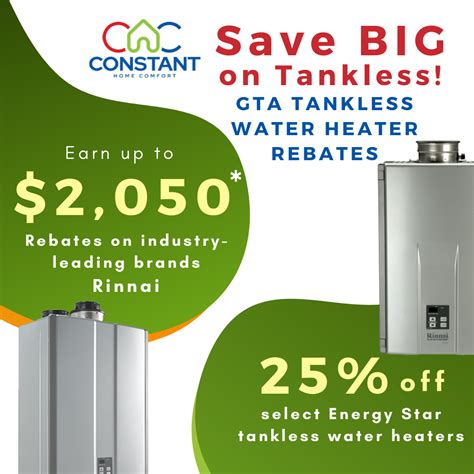Unlock Savings: How to Maximize Rebates on Tankless Water Heaters
When considering a new water heating system for your home, the advantages of tankless water heaters are hard to ignore. Unlike traditional water heaters, which heat water in a tank, tankless models provide hot water on demand, making them more energy-efficient and reducing utility bills. However, upfront costs can be a concern. Fortunately, various rebates and incentives can significantly offset these costs, allowing homeowners to realize substantial savings. This article explores how to maximize rebates on tankless water heaters effectively.
Understanding Tankless Water Heaters
Tankless water heaters, often referred to as on-demand water heaters, use powerful heating elements to warm water as it passes through the unit. This means you won’t run out of hot water and can reduce energy consumption by heating water only when needed. Despite the higher initial cost, tankless options tend to have a longer lifespan and lower operating costs than traditional models, often providing significant savings in the long run.
Research Available Rebates
The first step in maximizing savings is to research available rebates and incentives. Various programs exist at both the federal and state levels aimed at promoting energy efficiency and renewable energy solutions. Key sources include:
- Federal Tax Credits: The federal government often offers tax credits for energy-efficient home improvements, including tankless water heaters. Check the IRS website for the latest eligibility requirements and credit amounts.
- State Incentives: Many states have specific programs that offer rebates or tax deductions for energy-efficient appliances. Resources like the Database of State Incentives for Renewables & Efficiency (DSIRE) provide comprehensive listings of state-specific incentives.
- Utility Company Programs: Utilities frequently have rebate programs aimed at reducing energy consumption. Contact your local utility provider to find out if they offer human policies for tankless water heaters.
Choosing Energy-Star Rated Models
When shopping for a tankless water heater, look for models that have an Energy Star rating. These units meet stringent energy efficiency guidelines set by the Environmental Protection Agency (EPA) and often qualify for the maximum available rebates. Not only do Energy Star-rated appliances save more money in the long term, but they can also enhance your potential for financial incentives.
Get Multiple Quotes
Before making a purchase, obtaining several quotes from licensed contractors is essential. Prices can vary significantly depending on various factors, such as installation complexity, brand selection, and local labor rates. By comparing quotes, you can find the best deal and ensure you are getting a quality installation, which is crucial for long-term savings.
Consider Installation Costs
Proper installation is vital for maximizing the efficiency and lifespan of your tankless water heater. While some homeowners may consider DIY installations, it’s advisable to hire a licensed professional. Misinstallation can lead to inefficiencies and potential safety hazards. Additionally, professionally installed units are often eligible for more significant rebates, as many programs require a certified installation to qualify.
Check for Bundled Offers
Some manufacturers and retailers offer bundled deals that can substantially lower your total costs. These may include savings when purchasing a tankless water heater along with installation services or other home improvement products. It’s wise to keep an eye out for seasonal sales, promotions, and financing options that can further enhance your savings.
Stay Informed About Local Regulations
Local building codes may dictate what types of water heaters can be installed in your home. Sometimes, certain models may be incentivized more than others based on these regulations. Checking with your local building authority can ensure compliance and help you understand any potential rebates currently available.
Monitor Changes in Legislation
Incentives and rebates can change with new legislation. Staying updated on local, state, and federal regulations can help keep you informed about potential changes that may affect your eligibility for rebates. Signing up for newsletters from relevant organizations can ensure you don’t miss out on new opportunities for savings.
Conclusion
Investing in a tankless water heater can lead to significant energy savings and improve your home’s overall performance. By actively researching available rebates and incentives, choosing energy-efficient models, getting multiple quotes, and ensuring proper installation, you can maximize your savings and enjoy the numerous benefits of this modern technology. It’s worth the effort to unlock these savings, making a tankless water heater a smart and financially wise choice for homeowners.
FAQs
1. Are tankless water heaters more expensive than traditional ones?
Yes, tankless water heaters typically have higher upfront costs compared to traditional water heaters, but they offer long-term savings through reduced energy bills and longer lifespans.
2. How long do tankless water heaters last?
On average, tankless water heaters can last 20 years or more with proper maintenance, which is longer than traditional water heaters, which usually last 10-15 years.
3. Can I install a tankless water heater myself?
While some homeowners may consider DIY installations, it’s highly recommended to hire a licensed professional to ensure safety, compliance with local codes, and eligibility for rebates.
4. What factors affect the rebates for tankless water heaters?
Rebate amounts can vary based on the unit’s energy efficiency rating, local regulations, installation costs, and eligibility for various programs or incentives offered by manufacturers, utilities, or government agencies.
5. Where can I find information about available rebates?
You can find information on rebates through resources like the IRS, state energy offices, and the Database of State Incentives for Renewables & Efficiency (DSIRE), as well as local utility companies.
Download Rebates For Tankless Water Heaters
